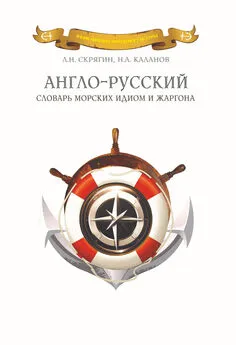Adam Makkai - Словарь американских идиом: 8000 единиц
- Название:Словарь американских идиом: 8000 единиц
- Автор:
- Жанр:
- Издательство:неизвестно
- Год:неизвестен
- ISBN:нет данных
- Рейтинг:
- Избранное:Добавить в избранное
-
Отзывы:
-
Ваша оценка:
Adam Makkai - Словарь американских идиом: 8000 единиц краткое содержание
Это обновленное и дополненное издание, содержащее более 8000 идиоматических
слов и выражений, причем каждое из которых снабжено грамматическим объяснением
и практическим примером. Словарь содержит лексемные идиомы, фразеологические
единицы и поговорки, имеющие особенное значение. В нем приведены наиболее
употребительные выражения только американского английского языка. Этот словарь — идеальное пособие для студентов, часто разъезжающих бизнесменов и просто
путешественников.
Словарь американских идиом: 8000 единиц - читать онлайн бесплатно полную версию (весь текст целиком)
Интервал:
Закладка:
[run through] {v.} 1. To make a hole through, especially with a sword; pierce. •/ The pirate was a good swordsman, but the hero finally ran him through. / 2. To spend recklessly; use up wastefully. •/ The rich man’s son quickly ran through his money. / Syn.: GO THROUGH(4). 3. To read or practice from beginning to end without stopping. •/ The visiting singer ran through his numbers with the orchestra just before the program. /
[run to] {v. phr.} To approximate; reach. •/ It has been estimated that the casualties will run to over 300,000 killed by cholera and starvation in the crowded refugee camps. /
[run to seed]See: GO TO SEED.
[run true to form] {v. phr.} To follow a usual way; act as expected; agree with how a person usually acts. •/ The little boy’s actions ran true to form. He bothered his mother until she gave him his way. / Compare: PAR FOR THE COURSE.
[run up] {v. phr.} 1. To add to the amount of; increase. •/ Karl ran up a big bill at the bookstore. / 2. To put together or make hastily; sew quickly together. •/ Jill ran up a costume for the party on her sewing machine. / 3. To pull (something) upward on a rope; put (something) up quickly. •/ The pirates ran up the black flag. /
[run up against]See: UP AGAINST.
[run wild] {v. phr.} To be or go out of control. •/ The students ran wild during spring vacation. / •/ The new supervisor lets the children run wild. / •/ The violets are running wild in the flower bed. / Compare: RUN RIOT.
[run with the hare and hunt (ride) with the hounds] {v. phr.} To appear to support both parties in a conflict; to conduct things in ambiguous ways. •/ Critics accused the king of running with the hare and hunting with the hounds. /
[running commentary] {n. phr.} A continual series of remarks. •/ My chiropractor gives me a running commentary on the health care debate while he is giving me a rubdown. /
[rush]See: BUM’S RUSH.
[Russian roulette] {n.} A game of chance in which one bullet is placed in a revolver, the cartridge cylinder is spun, and the player aims the gun at his own head and pulls the trigger. •/ Only a fool would risk playing Russian roulette. /
[rust away] {v. phr.} To disappear gradually through the process of rust or corrosion. •/ If you refuse to paint those metal bars on the window, they will soon rust away. /
[rustproof] {adj.} Free from rusting or corrosion; permeated with anti-rust chemical agents. •/ My new watch is rustproof and waterproof and I can wear it while swimming or taking a shower. /
S
[saber rattling]or [sword rattling] {n.} A show of military strength usually to frighten; a threat of military force. •/ The dictator marched his troops and tanks along the border of our country and did some saber rattling. /
[sack]See: GET THE SACK at GET THE BOUNCE(2), GIVE THE SACK at GIVE THE BOUNCE(2), HIT THE HAY or HIT THE SACK, LEAVE HOLDING THE BAG or LEAVE HOLDING THE SACK.
[sack in/out] {v.} , {slang} To go to sleep for a prolonged period (as in from night to morning). •/ Where are you guys going to sack in /sack out?/
[sacred cow] {n.} A person or thing that is never criticized, laughed at, or insulted even if it deserves such treatment. •/ Motherhood is a sacred cow to most politicians. / •/ The bold young governor had no respect for the state’s sacred cows. / •/ Television respects too many sacred cows. /
[sacrifice fly] {n.} A baseball hit high in the air that helps a runner score after it is caught. •/ Mantle drove in two runs with a single and a sacrifice fly. /
[saddle]See: IN THE SADDLE.
[saddled with] {adj. phr.} Burdened with; handicapped. •/ The business was so saddled with debt that the new owner had a hard time making a go of it for a couple of years. /
[saddle shoe] {n.} A white shoe with a black or brown piece of leather shaped like a saddle across the top of the shoe. •/ Mary wore bobby socks and saddle shoes. /
[safe]See: PLAY SAFE.
[safe and sound] {adj. phr.} Not harmed; not hurt; safe and not damaged. •/ The package arrived safe and sound. / •/ The children returned from their trip safe and sound. / Compare: WITH A WHOLE SKIN.
[safety blitz] {n.} A defensive play in football in which the defensive safety man makes a quick run to tackle the offensive quarterback. •/ Bob’s safety blitz kept Tom from making a touchdown. /
[safety glass] {n.} Two panes of glass with a sheet of plastic between them so that the glass will not break into pieces. •/ Safety glass is used in cars because it does not break into pieces. /
[safety in numbers] {n. phr.} Protection against trouble by being in a group. •/ Peter said, "Stay in a group; there is safety in numbers." /
[safety island]or [safety zone] {n.} A raised area in a highway or road to be used only by people walking. •/ John was half-way across the street when the light changed. He stayed on the safety island until it changed again. /
[sail]See: SET SAIL, RAKE THE WIND OUT OF ONE’S SAILS.
[sail close to the wind] {v. phr.} To be on the borderline between legality and illegality. •/ The wealthy tycoon sailed close to the wind during Prohibition. /
[sail into] {v.} , {informal} 1. To attack with great strength; begin hitting hard. •/ George grabbed a stick and sailed into the dog. / Compare: LAY INTO, PITCH INTO. 2. To scold or criticize very hard. •/ The coach really sailed into Bob for dropping the pass. / Syn.: BAWL OUT, LAY INTO.
[sail (right) through] {v. phr.} To conclude easily and rapidly; finish something. •/ The bright young man sailed through the bar exam in record time. /
[sailor collar] {n.} A large square collar like those worn by sailors. •/ Little Timmy’s suit has a sailor collar. / •/ Mary’s blouse has a sailor collar. /
[sail under false colors] {v. phr.} 1. To sail a ship, often pirate, under the flag of another country. •/ The pirate ship flew the American flag until it got near, then raised the black flag. / 1. To pretend to be what you are not; masquerade. •/ The garage hired Jones as a mechanic, but fired him when they found he was sailing under false colors. / •/ They found out that Smith was an escaped convict who had been sailing under false colors as a lawyer. /
[sake]See: FOR ONE’S SAKE.
[salad days] {n. phr.} , {informal} The period of one’s youth; a period of inexperience. •/ He was silly and immature during his salad days in high school. /
[sale]See: NO DEAL or NO SALE, ON SALE, WHITE SALE.
[sales check]or [sales slip] {n.} A paper which the clerk gives the person who bought something; a paper that shows what you bought in a store and how much you paid for it. •/ Mrs. Smith checked the sales slip with what she bought. / •/ Mary brought the sales check when she returned the dress so she could get her money back. /
[sales talk] {n.} A speech made to point out all the good reasons why the sale would help someone who might buy the product. •/ Mrs. Goldsmith gave the man a good sales talk about the new house. / •/ The coach gave a sales talk on exercise in the school assembly. /
[Salisbury steak] {n.} A broiled or fried hamburger patty sometimes containing eggs, milk, bread crumbs, and seasoning. •/ James ordered a Salisbury steak for lunch. /
[salt]See: BACK TO THE SALT MINES, TAKE WITH A GRAIN OF SALT also TAKE WITH A PINCH OF SALT, WORTH ONE’S SALT.
[salt away] {v.} , {informal} To save (money) for the future. •/ Every week Joe salts away half of his pay. /
[salt of the earth] {n. phr.} , {informal} One who helps to make society good and wholesome; a basically good or valuable person. •/ Everyone here considers Syd and Susan the salt of the earth because they are so generous. /
[salt pork] {n.} Very fat pork that has been packed in salt or dipped in brine for curing. •/ Mother cooked beans with salt pork for supper. /
[same]See: AT THE SAME TIME, ALL THE SAME, or JUST THE SAME, IN THE SAME BREATH, LIGHTNING NEVER STRIKES TWICE IN THE SAME PLACE, ONE AND THE SAME.
[same here] {informal} And it is the same with me; and the same for me. — Used only in speech. •/ Mary ordered an ice cream soda, and Jill said, "Same here." / •/ Tom said he was too tired to run any further, and Bill said, "Same here." /
[sand]See: HIDE ONE’S HEAD IN THE SAND.
[sand lot] {n.} A field, vacant lot, or other open place used as a sports playing field, usually by younger teams or by amateurs who can’t afford to use anything better. •/ Rogers Hornsby, who was National League baseball batting champion six times, first started playing on Texas sand lots. /
[sand-lot] {adj.} Of the kind seen on sand lots; not professional. •/ The professional football team was so confused by their opponents' fast play that they acted like a bunch of sand-lot amateurs. /
[sand trap] {n.} A low place on a golf course that is filled with sand to stop the ball. •/ The golfer lost four strokes trying to get the ball out of the sand trap. /
[sandwich board] {n.} Two advertising signs worn by a man, one on his chest and the other on his back. •/ The man walking along Main Street wore a sandwich board saying "Eat at Joe’s." /
[sauce]See: HIT THE SAUCE.
[save face] {v. phr.} To save your good reputation, popularity, or dignity when something has happened or may happen to hurt you; hide something that may cause you shame. •/ The policeman was caught accepting a bribe; he tried to save face by claiming it was money owed to him. / •/ Bill would not play in the game because he knew he could not do well and he wanted to save face. / •/ The colonel who lost the battle saved face by showing his orders from the general. / Contrast: LOSE FACE. — [face-saver] {n.} •/ The shop teacher’s note was a face-saver when another teacher thought John and Bill were playing hookey in town. / — [face-saving] {adj.} •/ The note was a face-saving idea. / — [face-saving] {n.} •/ Face-saving is not helped by too many invented excuses. /
Читать дальшеИнтервал:
Закладка:







